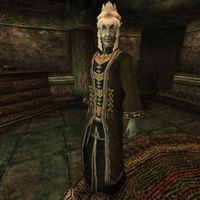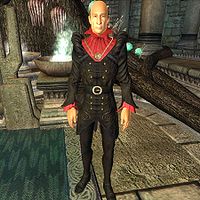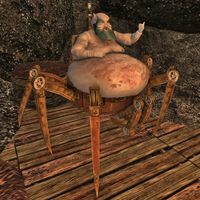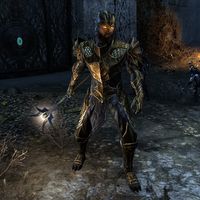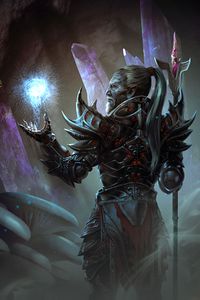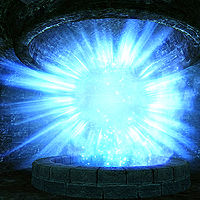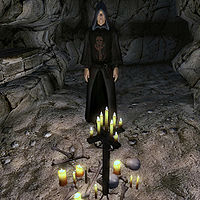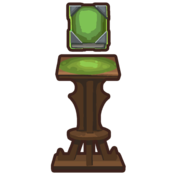Lore:Lifespan
This article documents the lifespans of the various races of Nirn, as well as the various methods of life-extension and resurrection.
Racial Lifespans[edit]
Beastfolk[edit]
Beastfolk tend to live a maximum of one hundred years.[1] Sload do not apply to this standard, having no outside limit to age. However, the oldest Sload adults must be buoyed by water lest they collapse under their own weight.[2] Centaurs have been known to call other races 'mortals', implying they have an extended lifespan.[3]
Men[edit]
Men tend to live a maximum of one hundred years.[1] Half-Elven men, despite their parentage, age as any other men do.[4] Outlying instances of unnatural human age can reach over two hundred years, though the cause of this infrequent longevity is undetermined.[5][6] According to Nordic myth, Orkey is responsible for the shortened lifespan of men. His machinations led to him instructing Alduin to eat the Nords' lifespans down to just six years. This was undone by Shor and Wulfharth, but in Wulfharth's haste to save everyone, he accidentally aged himself to death.[7][8]
Mer[edit]
Some sources say Mer tend to live twice or three times as long as men and beastfolk, with a two-hundred-year-old elf being old,[9] and a three-hundred-year-old elf being incredibly old.[1] However, being well over a century old is considered being young for an Altmer.[10] According to myth, Phynaster taught the Altmer to live one hundred years longer than their peers by shortening their stride.[11] However, some elves, such as Barenziah and Symmachus of Mournhold, have lived upwards of four hundred years without any known magical prolonging of their youth.[12] Other sources state that Mer live for over one thousand years naturally if they are not killed by other means.[13] Yet another account suggest that some Mer can remain mentally sharp into their late hundreds and live past the age of two hundred, although it can vary significantly between individuals and families. In some cases, reaching only one hundred twenty to one hundred thirty years was more common.[14] Orsimer are a notable exception, living brief lifespans under normal circumstances,[15] a result of Orkey's defeat at the hands of Shor according to Nordic legend,[8] but believed by the Orsimer themselves to be imposed by Malacath.[16]
Akaviri[edit]
The Tsaesci are are described as immortal by some,[17][18] but Imperial descendants of the race believed their typical aging was comparable to other races.[19] The Kamal survivors of the Second Akaviri Invasion lived well over two hundred years in hiding.[20][21]
Methods of Life Extension[edit]
Alchemy[edit]
Gyron Vardengroet, in an effort to prevent others from experiencing the same grief he went through after his parents' deaths, set out to make a potion that achieved biological immortality. After pouring over research from the Crystal Tower and gathering flora from all over Tamriel, he eventually succeeded in halting his aging with a potion he had brewed. However, he was unsure which of the many combinations he mixed resulted in the successful tonic.[22] The Gray Host brewed potions which could temporarily transform the drinker into Werewolf Behemoths,[23] which are noted immortals.[24][25] Brazzefk, a Dwemer alchemist, created and consumed a potion intended to make him into an immortal stone golem, but it instead turned him into an immovable stone.[26] The honey of the Isgareth Bee of Auridon allegedly halted aging upon consumption, but would wear off and need repeated consumption in order to maintain the effect.[27] The consumption of Gildergreen fruits was thought to extend one's lifespan.[28]
Apotheosis[edit]
Ascension to the status of godhood is one of the hardest and most mysterious methods of achieving immortality. The Tribunal infamously ascended using Kagrenac's Tools on the Heart of Lorkhan, utilizing the Heart's innate divine energy. Dagoth Ur formed a connection to the Heart without the tools through unknown means, likewise becoming a god.[29] Several mortals underwent a process known as mantling[30][31] during the Greymarches of the Shivering Isles, becoming Sheogorath[30][32] until the following Greymarch, when they were replaced by another and made into immortal Vestiges of their mortal selves.[31] According to legend, Sai was made a god by Reymon Ebonarm to assist in balancing the forces of mortals with his innate lucky presence.[33] The Numidium could be used to transcend Mundus and become a god.[34] The Duraki spawning pools of Skyreach were theorized to harness the energy of Nirncrux and use it to elevate mortal creatures and people to godly celestial manifestations of the constellations.[35] Jode's Core, if properly channelled through aeonstone, was thought to be capable of granting godhood.[36][37][38] Tosh Raka of Ka Po' Tun was said to have become a Dragon.[17] Some dubious sources claim that Tiber Septim apotheosized by absorbing the essences of several dragons.[39]
Body Alteration[edit]
Diseases of divine origin occasionally bestow immortality. Vampires are immortal, courtesy of their undead nature.[40][41] The Divine Disease, Corprus, renders those afflicted immune to disease and aging, alongside other debilitating side-effects.[42] The mechanical bodies of the Clockwork Apostles grant unending life if their internal organs are replaced. Those who do have no need for eating, breathing, or sleeping.[43][44] Briarheart implantations may be used to raise the dead.[45] Heart Stones function similarly to Briarhearts, but prevent the bearer from dying altogether, keeping them between life and death.[46][47][48]
Witches who transform themselves into hagravens seem to experience an extended lifespan,[49][50] as do hags.[51][52] Some witches were known to extend their lifespans without the need for transformation.[51] At least some have achieved this through Daedric pacts,[53] but it is not known whether this is the only method used.[51] Maormer rituals could turn the caster into a being of water and coral,[54] which could supposedly reform after death.[55][56] Worm Cult necromancers resurrected Emperor Leovic by transforming him into a Flesh Atronach.[57] Bosmer who undergo the irreversible Wild Hunt live forever, at the cost of their sanity.[58]
Divine Intervention[edit]
Rarely, gods will bestow unending life if it is requested of them or to those they deem fit. In ancient times, Wilderking would open his realm, the Shrouded Vale, to Nirn every century to recruit a new caretaker for the Fading Tree. The Wilderking would provide for the caretaker, granting them long life and sustenance.[59] After connecting with the Heart of Lorkhan, Dagoth Ur shared his divine essence with his followers,[60] granting them eternal life.[61] Gavos, a priest of Zenithar, saw his life extended by a miracle from the god for his hard work and toil to keep the Golden Anvil safe.[62][63] During the Interregnum, ancient scroll that magically appeared within the Imperial City granted eight priests of the Divines immortality, returning to their mortal form after death.[64] It was thought that Arkay was behind the scroll's magic.[65] It has been theorized that rarely, in times of crisis, the Aedra may revive individuals of importance to assist Mundus.[66] Through the Heart of Valenwood, the Green may resurrect individuals to serve as Silvenar.[67]
Daedric Princes are able to bestow longevity[53] and immortality in a variety of ways. Reachmen folk tales of Tancia tell of her entering into a bargain with a Prince, causing her to lose her sanity and become an immortal scourge.[68] Hircine has granted immortality to those who set out to hunt his finest beasts, returning their aging after their beast has been felled.[69] The first turned, the original beings who were first afflicted with Lycanthropy by Hircine in the Early Merethic Era,[70][71] were immortal.[72] Meridia's Purified were given immortality in exchange for subservience, willing or otherwise.[73][74] Mehrunes Dagon once entered into a pact which granted Chimere Graegyn immortality, but kept his aging, eventually leaving him crippled with arthritis.[75] Princes can bless a mortal with a Daedric form, seemingly fit with all of the form's abilities, but may take it away later.[76] Some Daedric Artifacts grant eternal life, such as the Ring of Hircine.[77]
Cernunnon was known to grant immortality to their champions. As long as the spirit remained undefeated, their oath-bound enjoyed effective immortality, as it was Cernunnon who had the authority to determine their deaths.[78][79][80] According to Nordic legend, Shor resurrected Wulfharth from his ashes.[7] Wulfharth then became a being of ash, capable of sustaining a solid form with rest. When grievously struck, rather than dying, he was merely reduced to a formless ash state.[81] Molag Bal was able to return a follower of Boethiah to life when in close proximity of his shrine.[82]
Spellcraft[edit]
Spells applied directly to the body have been known to extend life.[83] The Psijics were renowned for practicing life extension magic.[16] Talented mages were capable of significantly prolonging their lifespans.[37][84] Divayth Fyr lived for over four thousand years using magic,[85] but did not consider himself an immortal.[86] Void magic can transform individuals into immortal voidmothers through soul collection and offerings to the Void.[87][88] Powerful arcane experiments that go wrong can destroy the user's corporeal form, fusing them to the magical energies surrounding them. These individuals may manifest as a maelstrom of magicka.[89]:172 Grimkell, an Atmoran sorcerer of the Merethic Era, turned three of his former allies into stones in an ambush. The fourth target, Ulfgar, was accidentally turned into a 'living stone', allowing him to live for over four thousand years.[90] During the Dragon rule over Skyrim, Dragon Priests were granted a share of Dragon magic to become immortals. As the Dragon magic faded, the Draugr of the Priests' tombs would perform rituals on their sarcophagi to sustain their life.[91][92][93] To achieve a heightened state of lichdom, Hevnoraak planned to transfer his blood back into his body, reawakening him at the peak of his power.[94]
Resurrection has been accomplished with spells while maintaining the recipient's intelligence. Rare scrolls have been known to rejuvenate and resurrect fallen individuals moments after their death.[95] Although some have thought it impossible to completely resurrect a dead person whose soul belonged to a Daedric Prince,[96] Angof the Gravesinger managed to revive Faolchu, a Werewolf, centuries after his death.[97] An obscure arcane discipline known as life magic was used by the Gray Host in order to resurrect vampires and werewolves.[98] The souls of the fallen Host members were drawn into stone husks, inanimate vessels alchemically designed to house their life energy.[99][100] In a final ritual, the stone husks shattered and the mortal forms of the long-dead members were restored.[101]
Necromancy may be used to turn one's self into a Draugr, halting their aging infinitely.[102] During the Thrassian Plague, Corgrad was decimated by the disease. The lords of Corgrad performed sorcery to contain the disease which drained its ravaging effects into themselves. Those who were cured and their descendants gave their tainted blood to the lords, keeping them alive for millennia.[103][104] Circa 2E 582, in a bid to cure their decrepit condition once and for all, the lords kidnapped a fellow Altmer of untainted blood and prepared sorcery to turn him into one of their condition, making him immortal until later generations of pure blood could restore him.[103] Certain binding rituals prevent the aging of the prisoner, rendering them unaging and invulnerable.[15] Daedra may be bound in a blood sacrifice, allowing the binder to live as long as they remain bound.[27] Perena soul magic could grant immortality at the sacrifice of becoming an eternal watcher.[105][106] A similar ritual could be performed at the Dragonfire Cathedral, making the caster immortal at the cost of binding them to the Cathedral's premises.[64]
Spirit Transference[edit]
Transferring the soul out of a mortal body and into an object or unaging living vessel prevents aging, but can cause drastic changes in behavior.[107] Transference has occasionally been used as a curse, binding an unwilling subject to an unmoving object.[108] The most advanced form of transference is lichdom, a process in which necromancers place their soul within - and travel through - a physical object known as a phylactery.[109] If the advanced process is successful, the lich will survive in spirit form after being killed and can eventually reform its body.[110] After becoming a lich, the lich's physical body is left aged and withered. However, this can be circumvented with Illusion magic.[111]
Mortals who are soul-trapped before their death by worshippers of Molag Bal become Soul Shriven, reforming a replica of their body in Coldharbour. This replica is typically flawed due to the strong Padomaic influences of Oblivion.[112] If they die, their bodies reform, eventually turning them into mindless, feral beasts.[113] Those who lost their mind before becoming Soul Shriven are seemingly immune to the degrading effects.[114] Individuals with a unique Anuic aspect can reform their body perfectly, retaining their full abilities and intelligence.[112]
Time Dilation[edit]
When in realms outside of Mundus, time passes differently than mortals are conditioned to. Planes, while affected by time, are not subject to it and its limitations[31] and may adopt degrees of it by the choice of its host.[115] Mortals in realms with little-to-no passage of time experience a prolonged existence,[116][117] perceiving time at a slower rate than those on Nirn.[118] Shalidor is said to have stolen Glamoril, the secret of life, from Akatosh.[119] The exact function of this artifact is unknown, but it was related to life extension.[83] One of the College of Winterhold's many theories as to its function was that it allowed the Arch-Mage to live multiple lifetimes in a short span of time.[120]
Other[edit]
Azra Nightwielder survived for centuries suspended within a crystal.[121] A magical relic known as the Great Source resided within the Aetherian Archive during the First Era. A group known as the Firstmages harnessed the Source's power, resulting in the extension of their life.[122] It is rumored that several pools and springs throughout Tamriel can grant immortality, but no maps exist which depict these locations.[27] Mankar Camoran's realm, Paradise, made his followers immortal. They would reform in the realm if they ever died, wherever their death took place.[123][124] These 'ascended immortals'[125] weren't considered true immortals, and were referred to distastefully as 'unmortals'.[126] Those whose souls go to Oblivion may escape their designated realm with their mortal form intact and capable of returning to Nirn.[127]
See Also[edit]
- For more information on the burial and funerary practices of Nirn, see Death.
Books[edit]
- Ascendancy: Pathway to Lichdom by Gullveig the Ascendant — A short guide detailing the steps required to become a lich
- On Extending Existence by Barilzar, Mage of the Seventh Order and Artificer Extraordinaire — A mage's musings on prolonging life
- On Immortality by Anonymous — Musings on immortality
References[edit]
- ^ a b c Ask Us Anything: Variety Pack 4
- ^ Pocket Guide to the Empire, 1st Edition: The Wild Regions — Imperial Geographical Society, 2E 864
- ^ Elder Centaur's dialogue in Legends
- ^ Brief History of the Empire v 2 — Stronach k'Thojj III
- ^ The Armorer's Challenge — Mymophonus
- ^ Sirollus Saccus in Morrowind
- ^ a b Five Songs of King Wulfharth
- ^ a b Varieties of Faith: The Nords — Brother Mikhael Karkuxor of the Imperial College
- ^ Elynea Mothren's dialogue in Skyrim: Dragonborn
- ^ Leramil the Wise's dialogue in ESO
- ^ Varieties of Faith: The High Elves — Brother Mikhael Karkuxor of the Imperial College
- ^ Biography of Queen Barenziah — Stern Gamboge, Imperial Scribe
- ^ The Real Barenziah — Anonymous
- ^ Interview with a Dark Elf
- ^ a b Gurlak's dialogue in ESO
- ^ a b Ulliceta gra-Kogg's dialogue in ESO: Summerset
- ^ a b Mysterious Akavir
- ^ History of the Fighters Guild
- ^ Avita Pitio's dialogue in ESO: Elsweyr
- ^ The Second Akaviri Invasion — Yngmaer Raven-Quill, Historian Royal of the Bards' College, Solitude
- ^ Pocket Guide to the Empire, 1st Edition: The Elsweyr Confederacy — Imperial Geographical Society, 2E 864
- ^ The Sage — Aegrothius Goth
- ^ Stone Garden Werewolf Behemoth transformation in ESO: Stonethorn
- ^ Exarch Ulfra's dialogue during The Gray Council in ESO
- ^ Werewolf Behemoth Sigil memento description in ESO: Wolfhunter
- ^ Head of Brazzefk — Merethic Society
- ^ a b c On Immortality — Anonymous
- ^ Ardwen's dialogue in Skyrim
- ^ Plan to Defeat Dagoth Ur — Vivec
- ^ a b Jyggalag's dialogue in Oblivion: Shivering Isles
- ^ a b c Chamberlain Haskill Answers Your Questions — Chamberlain Haskill
- ^ Sheogorath's dialogue in Skyrim
- ^ King Edward, Part IX — Anonymous
- ^ Lives of the Emperors — Niso
- ^ Dawn of the Exalted Viper — The Exalted Viper
- ^ Kaalgrontiid's dialogue in ESO: Dragonhold
- ^ a b Abnur Tharn's dialogue in ESO
- ^ Cadwell the Betrayer's dialogue in ESO: Elsweyr
- ^ There Be Dragons — Torhal Bjorik
- ^ Daggerfall User's Guide
- ^ Generic dialogue regarding Vampires in Morrowind
- ^ Divayth Fyr's dialogue in Morrowind
- ^ Meet the Character - Proctor Luciana — Grimrald Brassbones
- ^ Appearance of Proctor Luciana Pullo in ESO: Clockwork City
- ^ The Care and Feeding of Briarhearts
- ^ Neloth's dialogue in Skyrim: Dragonborn
- ^ Ildari's Journal, vol. I — Ildari Sarothril
- ^ Ildari's Journal, vol. II — Ildari Sarothril
- ^ Appearance of Fallaise of Glenmoril Wyrd, Ettiene of Glenmoril Wyrd, and Isobel of Glenmoril Wyrd in Morrowind: Bloodmoon
- ^ Appearance of Fallaise, Ettiene, and Isobel in Skyrim: Dragonborn
- ^ a b c Rites Matron's dialogue in ESO: Markarth
- ^ Appearance of Lamenter of the Slain and Binder in the Dark in ESO: Markarth
- ^ a b To Posterity — Hafara
- ^ Appearance and abilities of Fleet Queen Taleria in ESO: High Isle
- ^ Tideborn Taleria's dialogue in ESO: High Isle
- ^ Admiral Galvendier's dialogue in ESO: High Isle
- ^ Emperor Leovic's dialogue in ESO
- ^ Pocket Guide to the Empire, 1st Edition: Aldmeri Dominion — Imperial Geographical Society, 2E 864
- ^ Henodras' dialogue in ESO
- ^ Dagoth Ur's dialogue in Morrowind
- ^ Vivec's dialogue in Morrowind
- ^ Daluion's dialogue in ESO: Blackwood
- ^ Arbitrator Gavos Douar's dialogue in ESO: Blackwood
- ^ a b Drake of Blades' dialogue in ESO: Imperial City
- ^ Arrianus Capius' dialogue in ESO: Imperial City
- ^ Ja'darri's dialogue in ESO: Dragonhold
- ^ Indaenir's dialogue in ESO
- ^ Scary Tales of the Druadach, Book 3 — Cassia Volcatia, Traveling Scribe
- ^ Haras' dialogue in ESO
- ^ A Cure for Lycanthropy — Archivist Ernarde of the Silver Dawn
- ^ Sage Svari Answers Your Questions — Sage Svari
- ^ Vykosa the Ascendant in ESO: Wolfhunter
- ^ Tharayya's dialogue in ESO: Wrathstone
- ^ King Narilmor's dialogue in ESO: Wrathstone
- ^ Tal Marog Ker's Researches — Tal Marog Ker
- ^ Aelif's dialogue, appearance, and abilities in ESO
- ^ Tharsten Heart-Fang's dialogue in Morrowind: Bloodmoon
- ^ Mochveda, Tuecille, and Erbogar's dialogue in ESO: Horns of the Reach
- ^ Cernunnon's dialogue in ESO: Horns of the Reach
- ^ Oathbreaker's achievement description in ESO: Horns of the Reach
- ^ The Arcturian Heresy — The Underking, Ysmir Kingmaker
- ^ Events of The House of Horrors in Skyrim
- ^ a b Arch-Mage Shalidor's dialogue in ESO
- ^ Savos Aren's dialogue in Skyrim
- ^ Alfe Fyr's dialogue in Morrowind
- ^ Divayth Fyr's dialogue during Vivec in Legends
- ^ Senan's Note — Senan
- ^ Nathari's dialogue in ESO: Markarth
- ^ The Elder Scrolls V: Skyrim: Prima Official Game Guide — David Hodgson
- ^ Ulfgar the Unending's dialogue in Morrowind: Bloodmoon
- ^ Kireth's Taarengrav Note — Kireth Vanos
- ^ Draugr and the Dragon Cult — Dragon Cult Chronicler, Skormvnir Kyrrund
- ^ Amongst the Draugr — Bernadette Bantien, College of Winterhold
- ^ Valdar's dialogue in Skyrim
- ^ Appearance and abilities of Scroll of Revivial in Blades
- ^ A Daedric Proposal — Galdrus Salobar, Sanguimancer Supreme
- ^ Vision of Angof's dialogue in ESO
- ^ Gwendis' dialogue in ESO
- ^ Exarch Tzinghalis' dialogue in ESO: Greymoor
- ^ Arkasis the Mad Alchemist's dialogue in ESO: Stonethorn
- ^ Sister Tharda's dialogue in ESO: Greymoor
- ^ Draugr Lord Aesliip's dialogue in Morrowind: Bloodmoon
- ^ a b Kinlord Nemfarion's dialogue in ESO: Summerset
- ^ Arillas' dialogue in ESO: Summerset
- ^ Watcher Shavmar's Journal — Watcher Shavmar
- ^ Watcher's Ritual Stole antiquity codex entry by Verita Numida in ESO: Greymoor
- ^ Terari Heladren's dialogue in ESO: Clockwork City
- ^ Broken Statue's dialogue in ESO
- ^ Ascendancy: Pathway to Lichdom — Gullveig the Ascendant
- ^ Mannimarco's dialogue in ESO
- ^ Vastarie's dialogue in ESO
- ^ a b Chaotic Creatia: The Azure Plasm — Doctor Rhythandius
- ^ Cadwell's dialogue in ESO
- ^ Lyris Titanborn's dialogue in ESO
- ^ Lord Fa-Nuit-Hen and Tutor Riparius Answer Your Questions 2 — Fa-Nuit-Hen and Tutor Riparius
- ^ "Death" of Morphotypical Entities — Doctor Rhythandius
- ^ Chaotic Creatia: The Azure Plasm — Doctor Rhythandius
- ^ Faven Indoril's dialogue in ESO: The Deadlands
- ^ A Minor Maze
- ^ Urag gro-Shub's dialogue in Skyrim
- ^ Azra Nightwielder's dialogue in Shadowkey
- ^ Firstmage Arnure's dialogue in ESO
- ^ Ruma Camoran's dialogue in Oblivion
- ^ Eldamil's dialogue in Oblivion
- ^ Ascended Immortals in Oblivion
- ^ Kathutet's dialogue in Oblivion
- ^ Lyris Titanborn's dialogue in ESO: Harrowstorm
